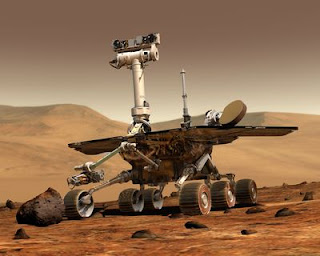 Apollo astronauts Buzz Aldrin and Michael Collins are calling for a new wave of space travel. "The best way to honour and remember all those who were part of the Apollo programme is to follow in our footsteps; to boldly go again on a new mission of exploration," said Aldrin on the eve of the 40th Anniversary of the Apollo landing.
Apollo astronauts Buzz Aldrin and Michael Collins are calling for a new wave of space travel. "The best way to honour and remember all those who were part of the Apollo programme is to follow in our footsteps; to boldly go again on a new mission of exploration," said Aldrin on the eve of the 40th Anniversary of the Apollo landing.But they're not talking about the Moon. They want to see Man on Mars.
Their call for a new highly ambitious programme of voyage and discovery will strike a chord with people around the world who recall the first Moon landing, which took place at a time when a sense of real excitement and thrall accompanied shuttle launches.
This time has long passed.
The to-and-froing of astronauts to the International Space Station has plodded along, met with increasing public ambivalence. Endeavour's launch last week provoked little more than a shrug. There is an appetite for something more exciting, more final frontier, and more heroic. A Mars mission would certainly tick these boxes. But would it be worthwhile scientifically, politically and economically?
For a start, it is by no means clear that current space technology would permit a Mars mission purely from the perspective of astronaut health. Even a few months in space has left a number of Russian cosmonauts bedridden for months, struggling to readjust to the affects of gravity.
A there-and-back mission to Mars would take around two and a half years, during which time the muscles of astronauts would become significantly atrophied. Exposure to high-energy cosmic radiation would also present serious risk. Spacecrafts can be shielded to a degree from cosmic radiation, but any mission would have to be carefully timed around the 11-year solar activity cycle. Spending an extended period in crowded stressful conditions would undoubedly take a pschological toll on even the most disciplined, levelheaded individual.
Would we be celebrating the Apollo landing with the same enthusiasm if its heroes, Armstrong, Aldrin and Collins, had died on their return to earth? Probably not. No matter how glorious the prospect of a Mars mission, we have to be confident that its crew will make it back in good health.
Despite the significant risks, a 2006 report by the Royal Astronomical Society concluded that astronaut health would not be the fundamental limitation for a Mars mission. And in a provocative article in The Telegraph today, Boris Johnson accuses today's society of having a spineless mentality towards the physical risks of space flight.
Scientifically the case for a Mars mission would be two-fold: searching for life and gathering evidence to further our understanding of planetary formation and the history of the solar system. Regardless of advances in robotic technology, there is no replacement for having a conscious, thinking human present to explore, gather samples and make on the spot decisions, argue manned mission proponents.
However, at least in the search for microbial life beneath the surface of Mars, there is also a cost. Contamination is a serious problem in any search for new types of life and it is almost impossible to decontaminate a spacecraft containing humans, food and waste. That's not to say that humans could never contribute to the investigation of life on Mars, should it ever show up. But they are not best qualified to carry out the initial search.
The cost of a manned Mars mission needless to say would be enormous. One optimistic proposal,
Mars Direct, estimated the cost at $55 billion over ten years. It's hard to say whether, from a technological point of view, this would be money well spent. The US administration has frequently cited the Apollo program, which helped deliver shuttle launch technology and satellite technology, as one of the best national investments ever made. But, perhaps more frequently, major projects such as the EUs Galileo satellite system, end up being criticised for gobbling up resources that would be better spent on smaller, more focussed projects. What is clear is that a Mars mission would divert a vast amount of money away from other space science projects over a lengthy period of time.
The 40th Anniversary of the Apollo landing is an apt moment for Nasa and other space agencies to reflect on the need for inspiring, adventurous missions that people feel part of. A widespread misconception is that a human presence in space is the ingredient that gives space science a wider appeal and that unmanned missions fail to capture people's imagination. This isn't true. One of the most inspiring missions of the last few years was the Mars Exploration Rover mission, in which two small robotic rovers covered vast areas of Martian surface.
Space agencies need to fund more high quality scientific missions like this one that push the boundaries of our appreciation and understanding of space. Sufficiently compelling arguments are yet to be made that a manned mission to Mars is the best way of doing this.
Note: This is my 100th post!
Note 2: I am going to start posting about news, I am to sporty!
-Nathan133


No comments:
Post a Comment